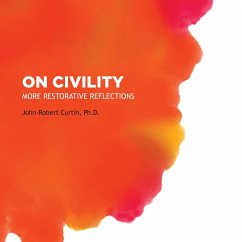This 2nd Edition of my collection of poetry centers on my reflections on the concepts surrounding civility. Writing the poems has been restorative to me and to my understanding of this ancient concept of "civility." Beginning with the traditional notion of manners and politeness (George Washington, Rules of Civility & Decent Behavior, 1744), and continuing to the more subtle concepts of compassion, dignity, human value, human worth, forgiveness, and self-dignity, this collection is an attempt to understand and explain a concept that has varied over time and through different cultures. The concept is often connected with civilization and civil because they share the same root word, but civility is more active, basic, and personal. "Being civil to one another is much more active and positive good than mere politeness or courtesy" (Robert B. Pippin, The Persistence of Subjectivity, 2005). In order to fully comprehend civility, one must reevaluate the status quo and build on the ancient principles of the interdependence of human beings (Dalai Lama, Beyond Religion, 2011). Civility is, therefore, interconnected with compassion, justice, and humanity. An important research question when contemplating civility is, "When did human life become disposable, and can we reverse that belief?" As much as civility is typically associated with qualities such as politeness and the display of good manners, contemporary social and political theorists have increasingly come to represent civic virtues such as tolerance, non-discrimination, and public reasonableness. Civility is, therefore, "more" than good manners (Melanie White, An Ambivalent Civility, Canadian Journal of Sociology, 2006).
Hinweis: Dieser Artikel kann nur an eine deutsche Lieferadresse ausgeliefert werden.
Hinweis: Dieser Artikel kann nur an eine deutsche Lieferadresse ausgeliefert werden.









